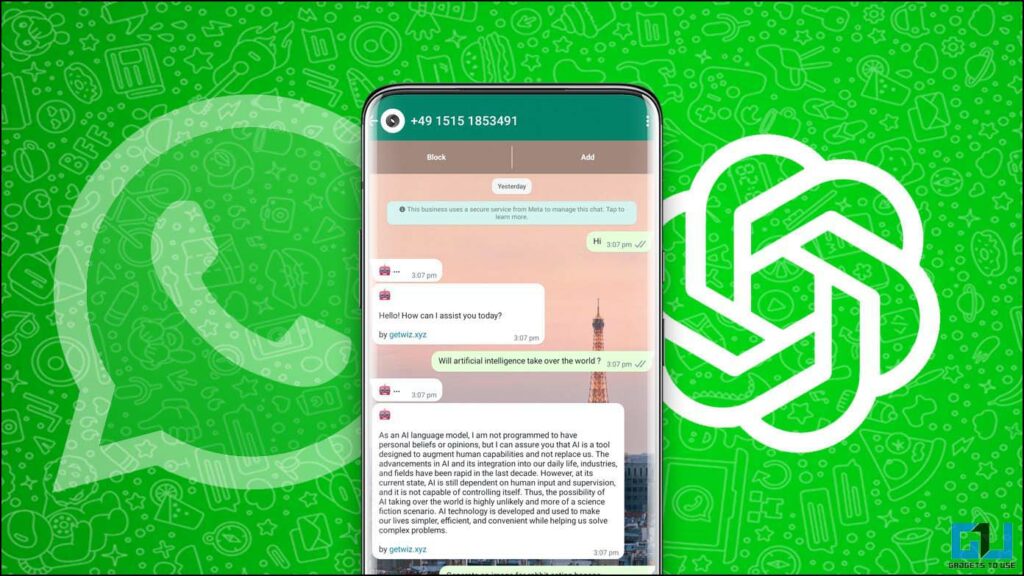The creation of AI-generated avatars of users for usage in virtual environments is supposedly a new feature that WhatsApp is working on. This breakthrough, which WABetaInfo discovered in an Android beta version of WhatsApp, makes use of Meta’s Llama AI models. Uploading self-portraits and urging Meta AI with phrases like “Imagine me…” or “@Meta AI imagine me…” in chats can help users start the avatar development process.
There is presently no known date for the feature’s widespread rollout; it is only in the limited beta testing stage. This project demonstrates WhatsApp’s growing use of AI to improve user interaction and customisation, building on the company’s recent release of customisable stickers created using text prompts.
In comparison to other AI platforms, such as OpenAI and Google, which exercise caution in generating AI avatars of real people, WhatsApp’s approach marks a departure by enabling users to create personalized digital representations. For instance, ChatGPT typically declines to produce images of real individuals, emphasizing privacy and ethical considerations. Similarly, Google’s Gemini technology prefers creating characters with a semblance of likeness rather than exact replicas to mitigate potential misuse.
Privacy and security concerns loom large over the deployment of AI avatars depicting real individuals. While WhatsApp has not disclosed specific privacy measures for its AI-generated avatars, stringent safeguards are anticipated to protect user data and regulate the usage of personal likenesses. Providing the feature as optional underscores WhatsApp’s commitment to empowering users with control over how their data is utilized.
The integration of Meta AI across Facebook, Instagram, and other Meta properties suggests that WhatsApp may serve as a testing ground for broader AI initiatives within Meta’s ecosystem. This strategic alignment positions WhatsApp as a pivotal platform in Meta’s overarching vision to leverage AI for enhancing user experiences across its portfolio of services.
The development of AI avatars on WhatsApp underscores the increasing convergence of AI technology with social media and messaging platforms. By enabling users to seamlessly create and deploy personalized digital representations, WhatsApp aims to enrich user engagement and interaction within virtual environments. This evolution reflects a broader industry trend towards integrating AI-driven functionalities that enhance personalization and user satisfaction.
In light of recent advancements in AI and machine learning, WhatsApp’s foray into AI avatars signifies a significant technological leap. This initiative not only showcases WhatsApp’s commitment to innovation but also underscores its strategic alignment with Meta’s broader AI strategy. By harnessing Meta’s Llama AI models, WhatsApp seeks to empower users with tools that transcend traditional messaging functionalities, offering new avenues for self-expression and interaction.
The potential implications of AI avatars extend beyond mere personalization. They herald a paradigm shift in how users interact with digital platforms, blurring the lines between virtual and real-world identities. As AI technology continues to evolve, the ethical and regulatory frameworks surrounding AI-generated content become increasingly pertinent. WhatsApp’s approach to AI avatars will likely influence industry norms and regulatory discussions regarding user privacy, data protection, and digital identity management.
Critically, the deployment of AI avatars on WhatsApp necessitates robust measures to safeguard user privacy and mitigate the risks of misuse. This includes implementing stringent data protection protocols, ensuring transparent user consent mechanisms, and empowering users with granular control over their digital representations. By addressing these concerns proactively, WhatsApp can foster trust and confidence among its user base, facilitating broader acceptance of AI-driven innovations.
Looking ahead, the rollout of AI avatars on WhatsApp represents a pivotal moment in the evolution of digital communication and social interaction. It exemplifies the transformative potential of AI in redefining how individuals engage with technology and each other. By enabling users to create personalized digital personas, WhatsApp not only enhances user engagement but also underscores its role as a trailblazer in leveraging AI for social good.
AI technology and social media platforms are coming together at a critical turning point, which WhatsApp’s creation of AI avatars marks. This project not only highlights WhatsApp’s strategic alignment within Meta’s larger AI ecosystem, but also its dedication to innovation. WhatsApp’s effort creates a standard for user-centric innovation and ethical AI deployment in the digital era as AI continues to transform digital communication and engagement.
If you like the article please follow on THE UBJ.
